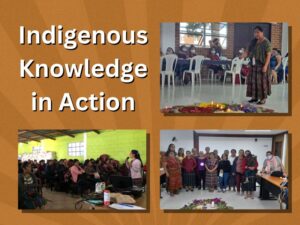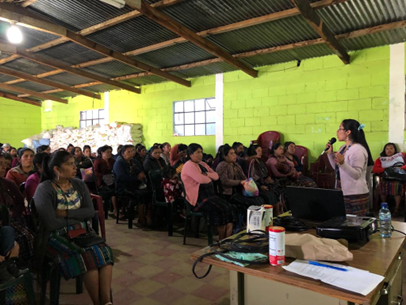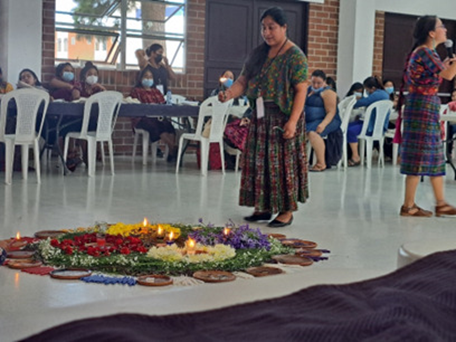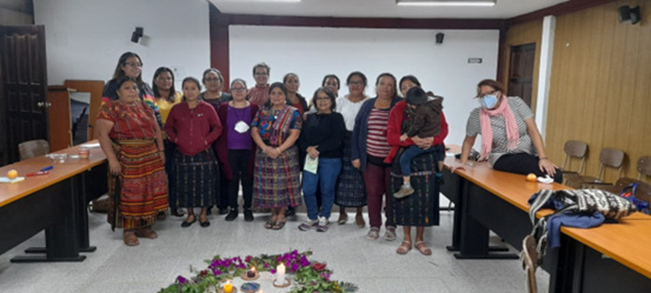Indigenous Knowledge in Action – Mayan Women on Local Policy Councils

Imagine Indigenous women at decision-making tables from the local level right up to the national, deliberating with communities and governments in the defense of Mother Earth and incorporating Indigenous knowledge and wisdom into state laws? This is something that doesn’t just happen. It takes a grassroots Indigenous-led organization to mobilize for active Indigenous participation.
In Guatemala, that organization is Kaji’ Ajpop. Founded and led by Maya Kaqchikel Indigenous women in 2019, Kaji’ Ajpop is more association than organization, promoting Indigenous rights through governance, environmental protection – specifically land and water, and civic participation.
Between June and November 2022, the association provided several training sessions to women’s committees on the importance of participation in decision-making spaces and determining opportunities for their participation.

A meeting of women leaders from the municipality of Sololá was held in February 2023.
As a result of this activity, five women’s committees and fifty-seven women leaders from the municipality of Sololá participated in the Municipal Development Council COMUDE, which approves projects to be implemented in the municipality. Their participation represented an opportunity to influence these projects. Indigenous perspectives and ancestral knowledge about their environment are always included in Indigenous-led projects and are mindful of climate change and climate mitigation strategies in their territories, women’s wellbeing, economic and political empowerment, and strategies to fight gendered-based violence in their families and communities.

Participation of members of women’s committees in the national dialogue meeting on racism, colonialism and discrimination to strengthen knowledge and be able to apply it in their communities held in the capital city. June 2022.
Kaji’ Ajpop’s project seeks to increase Indigenous women’s participation in locally and nationally oriented community decision-making spaces. To meet their objective, Kaji’ Ajpop developed and implemented a methodology to strengthen Indigenous women’s capacity to identify, articulate, and advocate for their collective rights. Last year, 46 women participated in the movement to enhance their knowledge about the importance of women’s political participation in the different decision-making structures and to build understanding of state procedures and laws in Guatemala. The goal of this work is to incorporate Indigenous knowledge and perspectives into these laws and the work of local administrations.

The work of Kaji’ Ajpop represents a significant example of how Indigenous knowledge can be applied in practice to decision-making processes. What might Canada learn from this model of participation in our own efforts to build nation-to-nation governance in line with the UN Declaration on the Rights of Indigenous peoples?
Kaji’ Ajpop’s leadership includes Natalia Atz Sunuc, a Maya Kaqchikel woman who was an Honorary Witness to the TRC in 2013, is a victim and survivor of Guatemala’s armed conflict, and served as General Coordinator of CEIBA, a former KAIROS global partner. Read more about Women and Community Consultations in this article by Natalia Atz Sunuc on the MERE Hub.
RESOURCE FEATURE – MERE Hub – Mother Earth and Resource Extraction: Women Defending Land and Water
Mother Earth and Resource Extraction is a living digital resource hub developed for and in consultation with women land and water defenders who are at the forefront in the protection of the environment, in Canada and across the globe. The MERE Hub brings together a range of original and existing material to support research, advocacy, information sharing, and movement building around the subject of resource extraction and its gendered implications.
TOMORROW: Check back tomorrow for the final post of Climate Action Week, where Connor Sarazin will share the Strawberry Teaching. We will also invite you to reflect on what you learned this week and how you pledge to apply these learnings to your climate actions.








